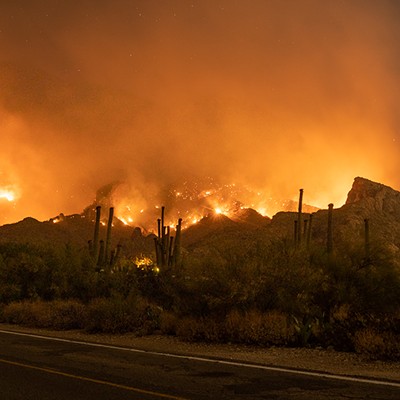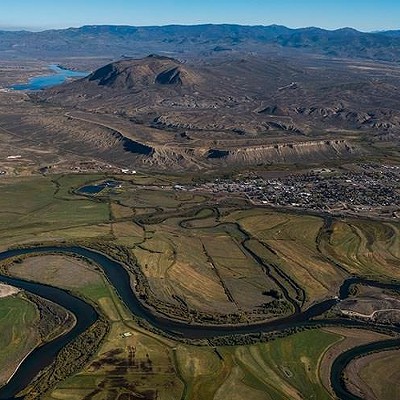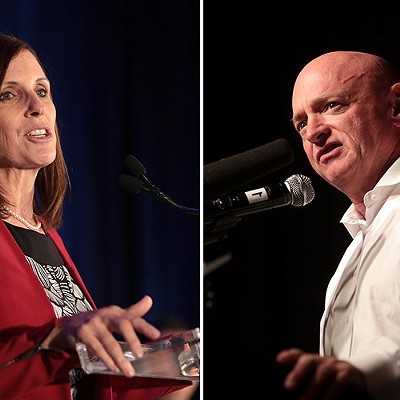Facing a sizable drop in water sales and anticipating anemic population growth, Tucson Water officials are asking for a 10 percent hike in what customers pay. The Tucson City Council is slated to take up the historically high request on March 24.
"We've made a lot of sacrifices (already)," Tucson Water Director Jeff Biggs told a meeting of the Citizens' Water Advisory Committee (CWAC) late last month. The committee was reviewing the utility company's proposed financial plan for the upcoming fiscal year, the first step in a process which eventually leads to rate hikes.
Part of Tucson Water's problem is a steep decline in water usage. Twelve months ago, the utility projected selling $128 million worth of water in the next year, but now estimates that figure will only be $115 million.
At the same time, home-building has slowed dramatically, meaning fewer new customers. Tucson Water is expecting less than 750 new water connections in the next year.
On top of that, the utility faces other financial challenges.
"Our delinquent payments have gone up, as have our payment arrangements," says Tucson Water spokesman Mitch Basefsky.
Compounding the problem is the recent history of Tucson Water revenue increases. During the boom years, annual hikes were all less than 5 percent, until 2007, when the increase was 6.2 percent.
Members of CWAC's finance subcommittee labeled these small increases as "mismanagement," and called three years with no increases "a huge mistake."
Last year, the initial hike proposed in a draft financial plan was almost 10 percent, but City Manager Mike Hein intervened. As a result, the City Council approved a 6.8 percent increase for water, along with a new 1.2 percent fee for conservation programs--in effect, raising the rate by 8 percent.
Hein says this year, however, the situation is different. "We have decreasing demand today, where a year ago, the issue was operational expenses," he says.
Jim Horvath, chair of the CWAC Finance Subcommittee, agrees with Hein's assessment. He also doesn't think the reduced increase last year was a mistake.
After last year's hike, the average Tucson Water customer's bill is now just less than $20.
Any rise in water rates this year will be combined on utility bills with the almost 50 percent hike in sewer fees that the Pima County Board of Supervisors recently levied. (See "Holy Crap!" Jan. 29.) Thus, by this time next year, the average residential-utility customer could see their monthly bill go from $40 to $51, which doesn't include taxes or the $14 that city residents pay for environmental services (i.e., trash collection).
Biggs told the CWAC that Tucson Water needs the extra money to balance the books.
"We've cut $11.5 million from our operating and maintenance budget, and $8 million from our capital improvement program. But we still require the 10 percent increase," he said.
One of the proposed reductions in the capital program is a delay, from 2012 to 2016, of the implementation of an 84-inch pipeline to transport recharged Central Arizona Project (CAP) water from Avra Valley. Instead, a smaller--and cheaper--48-inch pipe will be used.
Despite the pipe downsizing, Tucson Water officials say that by 2012, almost all existing groundwater-pumping in the center of town could stop, because enough CAP water will be available for use.
Meanwhile, the city is separately considering two other tax increases that would be passed on to ratepayers through their water bills; the Tucson Water's financial plan includes these increases as part of the proposed 10 percent increase.
First, the city is considering increasing the local utility tax--which is embedded in Tucson Water bills--from 2 to 3 percent.
At the same time, the city is contemplating an in-lieu tax on Tucson Water-owned property. If adopted, it would require the utility to pay $1.6 million--a cost which would then be passed on to Tucson Water ratepayers.
If the City Council were to decide against these two proposed increases, Tucson Water could theoretically decrease its financial-plan increase from 10 percent to 8 percent. However, Biggs told the CWAC that Tucson Water wants to keep the 10 percent increase in place, no matter what.
"We're proposing the council let us keep those funds," Biggs said to the CWAC, explaining what would happen if the tax increases are not adopted. "We'd put them into (operations and maintenance), capital projects or our reserve account."
Apparently satisfied with Biggs' explanations, the committee unanimously recommended that the City Council adopt the financial plan.
While Tucson Water has problems with its annual budget, it is also running out of voter-approved bond money with which to finance construction projects. It plans on selling $22 million worth of bonds shortly, thus maxing out the utility's authorization to sell bonds.
To address that situation, a $190 million revenue bond election could be held in November. Its passage might also mean higher water rates.
Even though a water-bond issue has never lost at the polls in Tucson, discussions are being held about alternatives which wouldn't require voter approval.
"We're evaluating all our options," says Deputy City Manager Mike Letcher. "Other cities in Arizona have other forms (of raising capital for water projects), and we'll make our decision shortly."
The City Council will decide the fate of Tucson Water's financial plan on March 24. The city would then hold a public hearing concerning how exactly the rates would be increased on June 2.












